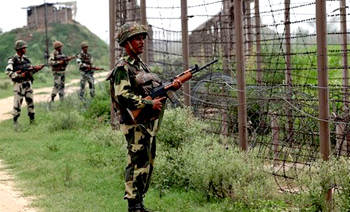Srinagar, Oct 10: Pakistan is set to hold security council meeting on Friday after India had yesterday sent out a strong warning saying that its neighbouring country will have to bear an "unaffordable" cost if it persists with its "adventurism"
After the Centre gave the India Army orders to retaliate to the Pakistani firing, there are reports that there has been a sharp decline in shelling from across the International Border.
 In the week-long violence in Jammu and Kashmir, eight people have lost their lives and over 60 have been injured.
In the week-long violence in Jammu and Kashmir, eight people have lost their lives and over 60 have been injured.
Modi, while addressing an election rally in Maharashtra's Baramati, the turf of NCP chief and former Defence Minister Sharad Pawar, slammed those targeting the government on the issue through a public discourse, saying it demoralised the jawans fighting on the border.
"Such an issue should not be part of a political debate... Elections will come and go, governments will come and go, but please don't demoralise those fighting on the border by debating these things for political gains," said Modi who had been attacking the previous UPA government over its dealing with Pakistan in the run-up to Lok Sabha elections.
In Delhi, Defence Minister Arun Jaitley said, "Pakistan in these attacks has clearly been the aggressor but it must realise that our deterrence will be credible. If Pakistan persists with this adventurism, our forces will make the cost of this adventurism unafforable."
India's message has reached Pakistan, he said, adding the strong Indian response will continue if Pakistan persists with firing and shelling.
Pakistan Rangers shelled almost the entire 192-km border
overnight. Nearly 30,000 people have been displaced following one of the worst violations of the 2003 ceasefire by Pakistan which has left eight people dead and 80 others, including nine security men, injured since October 1.
"Pakistani Rangers continued with unprovoked mortar shelling and heavy automatic weapon firing on BSF posts all along International Border (IB) since 2045 hours last night," a BSF spokesman said in Jammu.
Jaitley said if Pakistan wants peace on the borders, it should stop what it is doing.
"Pakistan has to stop this unprovoked firing and shelling. As long as that continues how can there be peace."
Asked about chances of talks between leaders of the two countries, he shot back, "how can you talk when firing is on?"
Underlining that India is a responsible country which is not an aggressor but is responsible for fully protecting its people and land, the Defence Minister said, "Our forces are taking all steps they can to protect our people and land."
Both Modi and Jaitley attacked the opposition leaders who have been criticising the government over its handling of the border situation.
Targeting Pawar, who had slammed him for holding poll rallies in Maharashtra when there was tension on the border, Modi said, "When you were the defence minister, there were problems with Pakistan and China on the border. Did you ever bother to go to the border then?"
"There have been terror strikes in Maharashtra during your tenure...Mumbai, Malegaon, Pune. You could not even reach the terrorists, leave alone catching them. In the spirit of patriotism, we never politicised the issue," he said.
Jaitley also attacked opposition leaders for their "ill-informed" criticism of the government over ceasefire violations.
"They should at least know this much as to what extent our forces are going to protect the borders," he said.
Congress Vice-President Rahul Gandhi has attacked the government over ceasefire violations and Chinese incursion, questioning its policies.
Jaitley singled out Pawar, saying he should have been more informed as a former defence minister.
Asked about Pakistan's motives behind the escalation, Jaitley said he would not like to speculate but firing could be a cover for infiltration and also an effort by it to precipitate tension where none existed.
"Our forces have only one option which is to respond adequately," the Defence Minister said.
He said many militants have been killed in firing since floods hit Jammu and Kashmir, an evidence of Pakistan's attempts to push more militants into Indian territory.
Asked why Pakistan is doing it now, he said the question should be put to those across the border.






Comments
Add new comment